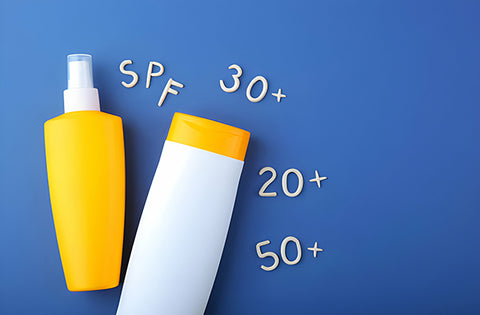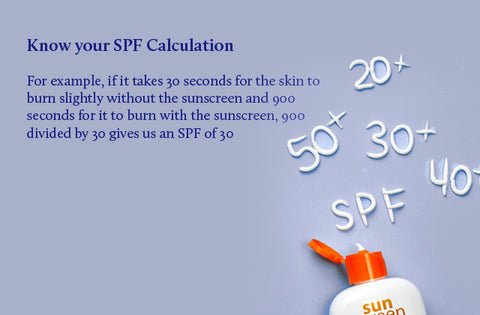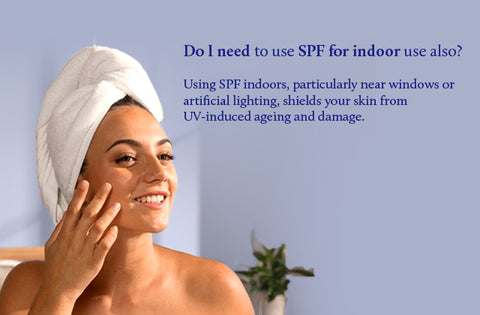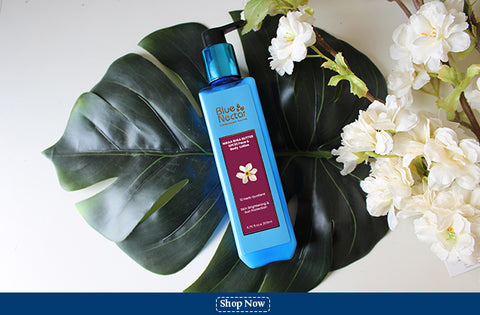What is my SPF Requirement ?
| Estimated Reading Time: 5 minutes |
SPF, or sun protection factor, is an essential component of any skincare regimen, particularly in areas with significant UV exposure. Protecting your skin from damaging ultraviolet (UV) radiation requires knowing your SPF requirement and how to calculate it. We'll examine the importance of SPF, its calculation, and the reasons it's required even for indoor use in this post.

Table of Content:
|
What is my SPF requirement?
Finding out how much SPF you need requires evaluating how sensitive your skin is to sun exposure as well as how much time you spend outside. Applying sunscreen with at least SPF 30 is generally advised for everyday protection. For prolonged outdoor activity, people with fair or sensitive skin would need a higher SPF, such as 50 or even 100.
Know your SPF calculation
For example, if it takes 30 seconds for the skin to burn slightly without the sunscreen and 900 seconds for it to burn with the sunscreen, 900 divided by 30 gives us an SPF of 30.
The Sun Protection Factor (SPF) is a measure of a sunscreen's effectiveness against UVB rays, which cause sunburn. However, SPF does not account for protection from UVA rays, which penetrate deeper into the skin and contribute to premature aging. UVA rays are another type of UV radiation from the sun. Unlike UVB rays, UVA rays penetrate deeper into the skin. They're associated with premature aging, such as wrinkles and age spots, and can also contribute to skin cancer development. UVA rays are present throughout the day and can penetrate clouds and glass, making them a constant threat to skin health.

Contrary to common belief, higher SPF values do not necessarily provide significantly greater protection. For instance, while SPF 50 may seem much higher than SPF 30, it only blocks around 1.3% more UVB rays. Therefore, relying solely on SPF values may be misleading.
Proper application and reapplication of sunscreen are essential for effective protection, regardless of SPF. Sunscreen should be applied generously to all exposed skin and reapplied every two hours, especially after swimming, sweating, or towel-drying.
Choosing a broad-spectrum sunscreen is crucial as it protects against both UVA and UVB rays. Health organizations, such as the World Health Organization, recommend using sunscreen with an SPF of 30 or higher to ensure adequate protection.
Ultimately, consistent and correct use of sunscreen is more important than solely relying on SPF values. By applying sunscreen properly and regularly, individuals can minimize the risk of sunburn, premature aging.
If you have more outdoor routine, higher SPF is required
The higher SPF extends the time it takes for UVB rays to cause skin redness, providing more effective defense during extended periods of sun exposure.
Using sunscreen with a higher SPF provides increased defense against UVB rays, reducing the risk of sunburn and skin damage during prolonged sun exposure. It allows for extended outdoor activities, requires less frequent reapplication, and is particularly beneficial for sensitive skin or fair skin tones. By preventing sunburn, higher SPF sunscreen minimizes the risk of long-term skin damage, including premature aging. Incorporating higher SPF sunscreen into your routine ensures comprehensive protection and healthier skin during outdoor activities.

Do I need to use SPF for indoor use also?
Using SPF indoors, particularly near windows or artificial lighting, shields your skin from UV-induced aging and damage.
Using SPF indoors is often overlooked, but it's crucial for protecting your skin from the harmful effects of UV radiation, which can penetrate through windows and indoor lighting.
By incorporating sunscreen with SPF into your indoor skincare routine, you create a barrier against UV-induced aging, reducing the risk of wrinkles, fine lines, and other signs of premature aging.
Whether you're working near a window or spending time under artificial lighting, applying SPF indoors helps maintain the health and integrity of your skin by shielding it from UV damage.

Additionally, regular use of SPF indoors can contribute to a more even skin tone and texture, as it prevents UV-induced hyperpigmentation and sunspots from developing.
Make SPF a daily habit, even when you're indoors, to ensure comprehensive protection against UV-induced aging and maintain the youthful appearance of your skin.
Which type of SPF is good for your skin ?
Sunscreen is an essential part of any skincare regimen since it shields the skin from the sun's damaging ultraviolet (UV) radiation. But not every sunscreen is made equally. With many advantages for your skin and general health, plant-based sunscreens are a healthy substitute for conventional chemical sunscreens. Here we will discuss the benefits of plant-based sunscreen over chemical sunscreens and why using one for your skin is a smart move.

What is a plant based SPF ?
Plant-based SPF refers to sunscreens or sun protection products that contain ingredients derived from plants. These ingredients are often natural oils, extracts, or compounds obtained from botanical sources known for their potential sun-protective properties.
Advantages of Sunscreens Made of Plants:
1. Kind to Skin: Sunscreens derived from plants are safe for all skin types, even those with sensitive skin. They are the best option for people with sensitive skin because they are less likely to irritate the skin or trigger allergic responses than chemical sunscreens.
2. Broad-Spectrum Protection: Sunscreens derived from plants provide broad-spectrum protection, defending the skin from UVA and UVB radiation. This all-encompassing protection lowers the risk of skin damage and delays the onset of sunburn, and delays the aging process.
3. Ingredients Not Toxic: In comparison to chemical sunscreens, plant-based sunscreens are safer and more environmentally friendly because they are made with natural chemicals obtained from plants. They don't include dangerous substances like oxybenzone and octinoxate, which have been connected to hormone imbalances and damage to coral reefs.
4. Appropriate for Skin Sensitive: Because they are hypoallergenic and unlikely to irritate skin or trigger allergic responses, plant-based sunscreens are a good option for anyone with sensitive skin.
5. Eco-Friendly: Plant-based sunscreens are biodegradable and do not harm marine life or coral reefs, making them a sustainable choice for conscientious consumers.
In conclusion, prioritizing SPF protection, whether indoors or outdoors, is essential for maintaining healthy skin and preventing sun damage. Understanding your SPF requirement and choosing broad-spectrum sunscreen with proper application ensures effective defense against UV rays. Additionally, opting for plant-based SPF offers a natural and eco-friendly alternative, promoting skin health and environmental sustainability. By incorporating SPF into your daily routine, you can enjoy the benefits of sun protection while caring for both your skin and the planet
Recommended Products by Blue Nectar:
Niraa Shea Butter SPF 30 Face & Body Lotion | Skin Brightening & Sun Protection























Leave a comment